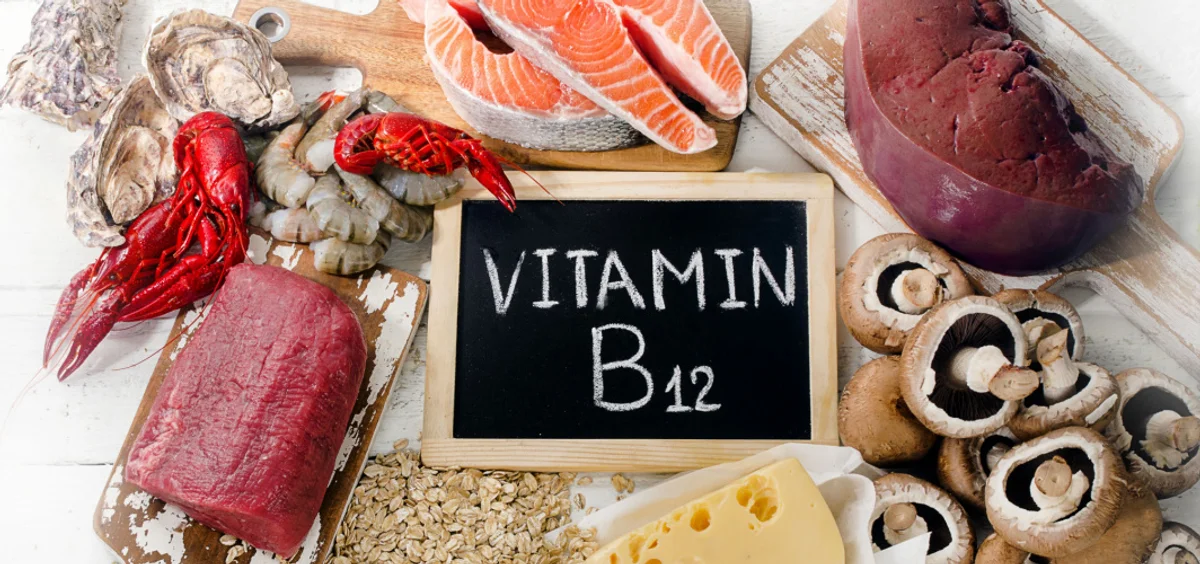- Home
- Blog
- General Health
10 Best Vitamin B12 Foods To Add To Your Diet
General Health
10 Best Vitamin B12 Foods To Add To Your Diet
By Apollo Pharmacy, Published on- 17 August 2023, Updated on -23 August 2024
Share this article
0
0 like

Vitamin B12 is an essential nutrient that plays a crucial role in maintaining the health of our nervous system and red blood cells. As our bodies cannot synthesise Vitamin B12 on their own, incorporating rich dietary sources becomes fundamental to overall well-being. While it is primarily found in animal-based products, there are several vitamin B12 foods for vegetarians as well. In this article, we will explore the best sources of vitamin B12 foods and vitamin B12 supplements along with their nutritional values, benefits, signs of deficiency, and recommended daily intake.
Why Do We Need Vitamin B12?
Vitamin B12 is essential for:
- Functioning of the Nervous System: It supports the health of the nervous system by aiding in the production of myelin, a protective covering for nerves.
- Synthesis of Red Blood Cells: It is instrumental to the synthesis of healthy red blood cells, which carry oxygen throughout the body.
- Synthesis of DNA: It is involved in DNA synthesis, which is important for the repair, division and growth of cells.
- Energy Production: It helps convert food into energy, ensuring optimal metabolic function.
10 Best Vitamin B12 Foods
1. Clams
Nutritional Value: 100 g of cooked clams provide 98.9 μg of vitamin B12.
Benefits: Clams are an excellent source of vitamin B12, protein, iron, and omega-3 fatty acids. They promote heart health, support brain function, and enhance immune function.
2. Beef Liver
Nutritional Value: 100 g of beef liver contains 2.6 μg of vitamin B12.
Benefits: Beef liver is a nutrient-dense organ meat that not only provides vitamin B12 but also supplies iron, zinc, and vitamin A. Moreover, it supports brain health, boosts energy levels, and aids in red blood cell production.
3. Trout
Nutritional Value: 100 g of trout contains 4.3 μg of vitamin B12.
Benefits: Trout is a delicious fish that offers vitamin B12, omega-3 fatty acids, and high-quality protein. It enhances cognitive function, lowers inflammation, and supports heart health.
4. Milk and Dairy Products
Nutritional Value: 100 g of milk has 0.5 μg of vitamin B12.
Benefits: Milk and dairy products are excellent sources of vitamin B12 for individuals who consume animal products. They also provide calcium, vitamin D, and high-quality protein for bone health and muscle growth.
5. Salmon
Nutritional Value: 100 g of salmon provides 3.2 μg of vitamin B12.
Benefits: Salmon is rich in omega-3 fatty acids, protein, and vitamin B12. It helps reduce the risk of heart disease, supports brain health, and reduces inflammation.
6. Eggs
Nutritional Value: 100 g of eggs have 1.1 μg of vitamin B12.
Benefits: Eggs are a versatile food that offers vitamin B12, high-quality protein, and essential nutrients. They provide ‘good’ cholesterol, promote muscle growth, and provide key vitamins and minerals.
7. Sardines
Nutritional Value: 100 g of sardines contain 8.9 μg of vitamin B12.
Benefits: Sardines are a nutritional powerhouse, providing vitamin B12, omega-3 fatty acids, calcium, and vitamin D. They contribute to heart health, bolster bone health, and lower the likelihood of chronic illnesses.
8. Fortified Plant-based Milk
Nutritional Value: The amount of vitamin B12 in fortified plant-based milk varies.
Benefits: Fortified plant-based milk alternatives, such as soy milk and almond milk, are often enriched with vitamin B12 for individuals following vegetarian or vegan diets. They provide an alternative source of this essential nutrient.
9. Nutritional Yeast
Nutritional Value: 1 tablespoon of nutritional yeast contains approximately 4 μg of vitamin B12.
Benefits: Nutritional yeast is a popular ingredient amongst vegans and vegetarians. It is a good source of vitamin B12, protein, and essential minerals. It adds a savoury, cheese-like flavour to dishes.
10. Tuna
Nutritional Value: 100 g of tuna contains 2.2 μg of vitamin B12.
Benefits: Tuna is a versatile fish that supplies vitamin B12, protein, selenium, and vitamin D. It supports heart health, aids in muscle growth and repair, and promotes healthy skin.
What are the Signs of Vitamin B12 Deficiency?
A deficiency of vitamin B12 can lead to various symptoms and health issues. A few typical indications of a vitamin B12 shortage are:
- Fatigue and Weakness: Vitamin B12 plays a crucial role in energy production. Deficiency can lead to reduced red blood cell formation, resulting in less oxygen being delivered to tissues and causing feelings of fatigue and weakness.
- Neurological Problems: Nerve damage due to vitamin B12 deficiency can result in tingling or numbness in the hands and feet, difficulty walking, memory problems, and mood disturbances.
- Anaemia: Vitamin B12 deficiency can lead to megaloblastic anaemia, which is characterised by abnormally large red blood cells and reduced oxygen-carrying capacity.
- Digestive Issues: Some individuals may experience digestive problems such as loss of appetite, constipation, or diarrhoea.
- Pale Skin: B12 deficiency can cause pale or jaundiced skin due to the lack of healthy red blood cells.
How Much Vitamin B12 Do We Need?
The recommended daily intake of vitamin B12 varies depending on age, sex, and individual circumstances. The recommended dietary allowance (RDA) for adults is 2.4 micrograms (μg) per day. However, women who are expecting or nursing might need a little bit more.
It's important to note that individuals following strict vegetarian or vegan diets may have a higher risk of B12 deficiency and may need to consider vitamin B12 supplements or consume fortified foods regularly.
Conclusion
An essential component of good health is vitamin B12. Despite the fact that it is mostly present in food from animal sources, vegetarians and vegans do have choices. Your nutritional needs can be met, and deficiency can be avoided by including a variety of foods high in vitamin B12. These nutrients can help with energy generation, neuron function, DNA synthesis, and red blood cell development when consumed regularly. Remember to seek personalised guidance on fulfilling your vitamin B12 needs from a healthcare practitioner or qualified dietician.
Explore Vitamin B12 Supplements
Services
General Health
Frequently asked questions
While it may be challenging to obtain sufficient vitamin B12 solely from plant-based sources, fortified plant-based foods and supplements which can be beneficial for individuals following vegetarian or vegan diets.
Vitamin B12 is generally considered safe, even at high doses. However, it is always advisable to follow the recommended daily intake and consult a healthcare professional before starting any supplements.
Vitamin B12 deficiency can typically be reversed with appropriate supplementation or dietary changes. However, severe or prolonged deficiencies may require medical intervention.
Natural plant-based sources of vitamin B12 are limited. Fortified plant-based foods, such as cereals and nutritional yeast, are good options for individuals following a vegetarian or vegan diet.
Leave Comment
Services
Recommended for you
.jpg?tr=q-85)
General Health
Daily Energy Boost Without Caffeine? These Gummies Have You Covered
Looking for a daily energy boost without caffeine? Discover how these innovative gummies provide sustained energy, enhanced focus, and natural vitality—no jitters or crashes.

General Health
Safe Ways to Track Weight After Major Pregnancy Weight Gain
Learn how to safely track weight and BMI after major pregnancy weight gain. Discover smart BMI meters, gentle supplements, and recovery tips.

General Health
10 Best Face Serums In India
Which face serum can suit your skin? Unlock all your information in this article where we have highlighted the best 10 face serums in India. Find the perfect product to enhance your skin's texture and radiance.
Subscribe
Sign up for our free Health Library Daily Newsletter
Get doctor-approved health tips, news, and more.

